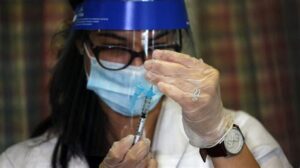Explore the RSV virus, its infection mechanism, vaccine development and efficacy, and future research directions in this comprehensive guide.As the cold season approaches, concerns about respiratory viruses become more prominent, particularly the respiratory syncytial virus (RSV). This common yet often underestimated virus poses a significant threat, especially to infants and the elderly. Understanding how the RSV virus operates is crucial in combating its spread and minimizing its impact. In this blog post, we will delve into the mechanics of RSV infection, exploring how it infiltrates the body and the immune response it elicits. We will also discuss the development of the RSV vaccine, its efficacy in preventing infection, and the ongoing research that aims to enhance its effectiveness. With new advancements on the horizon, the future of RSV vaccine research holds promise for better protection against this challenging respiratory illness. Join us as we unravel the complexities of RSV and the vital role of vaccination in safeguarding public health.
Understanding RSV Virus
Respiratory Syncytial Virus (RSV) is a significant cause of respiratory infections, particularly in infants and young children. Characterized by its highly contagious nature, RSV can lead to serious conditions such as bronchiolitis and pneumonia. It is primarily spread through respiratory secretions, making it crucial for parents and healthcare providers to take precautionary measures during the RSV season.
The virus primarily affects the lungs and respiratory tract. Upon infection, RSV invades the epithelial cells of the respiratory system, leading to inflammation and increased mucus production. This response contributes to the symptoms associated with RSV infection, such as coughing, wheezing, and shortness of breath. Understanding how RSV works is essential for developing effective treatments and preventive measures, including vaccines.
Healthcare professionals typically diagnose RSV infections through a combination of clinical symptoms and laboratory tests. By identifying the virus promptly, they can initiate timely interventions to manage the symptoms and reduce the risk of severe complications, particularly in high-risk populations like premature infants an
Mechanism of RSV Infection
Respiratory Syncytial Virus, commonly known as RSV, primarily affects the respiratory tract, especially in infants and immunocompromised individuals. Understanding the mechanism of RSV infection is crucial for developing therapeutic interventions and vaccines. RSV infection typically begins with the virus binding to the epithelial cells of the airway. This interaction is facilitated by the fusion (F) protein on the virus’s surface, which also plays a significant role in the virus’s ability to invade host cells.
Once RSV attaches to the host cell, it enters through a process known as endocytosis. Inside the cell, the virus releases its genetic material, which hijacks the host’s cellular machinery to produce new viral particles. This replication process leads to cell death and contributes to the inflammation and mucosal damage observed during RSV infections. The destruction of epithelial cells can result in airway obstruction, thereby exacerbating symptoms such as wheezing and breathing difficulties.
The host immune response is a critical factor in RSV infection. While it is essential to control the viral spread, the immune response can also cause further damage to lung tissues. The recruitment of inflammatory cells, such as neutrophils and eosinophils, can lead to enhanced airway hyperresponsiveness and contribute to the clinical manifestations of the disease. Understanding this delicate balance between the immune response and viral propagation is integral to developing effective vaccination strategies against RSV.
Development of RSV Vaccine
The Respiratory Syncytial Virus (RSV) is a significant cause of respiratory illness, especially in infants and the elderly. The development of an RSV vaccine has been a critical area of research, aimed at preventing the complications associated with this virus. Researchers have employed various approaches to create effective vaccines.
One of the prominent methods in the development of the RSV vaccine is through the use of live-attenuated viruses. These vaccines use a weakened form of the virus that can stimulate an immune response without causing severe disease. This method has shown promise in eliciting robust immune defenses.
Another approach involves subunit vaccines, which contain specific pieces of the virus rather than the whole pathogen. For instance, these vaccines often incorporate protein antigens found on the surface of the RSV to trigger the immune system while being safer than live viruses. The goal is to provoke an effective immune response that can recognize and fight off actual infections in the future.
| Vaccine Type | Mechanism | Advantages |
|---|---|---|
| Live-Attenuated Vaccine | Uses weakened virus | Strong immune response, potential for lifelong immunity |
| Subunit Vaccine | Contains viral proteins | Lower risk of causing disease, targeted immune stimulation |
Furthermore, the development of RSV vaccines is not limited to traditional methods. Innovative technologies such as mRNA vaccines, which have gained attention due to their rapid development during the COVID-19 pandemic, are also being explored for RSV. This method involves using messenger RNA to instruct cells to produce viral proteins and present them to the immune system.
As researchers continue their efforts, the development of RSV vaccines remains a top priority. With ongoing trials and advancements in immunology, the hope is to provide an effective vaccine that may soon pro
Efficacy of RSV Vaccination
The efficacy of the RSV vaccine is crucial in understanding its impact on public health, particularly for high-risk groups such as infants, elderly individuals, and those with compromised immune systems. Recent studies have indicated that the RSV vaccine can significantly reduce the severity of symptoms and the incidence of serious outcomes related to RSV infection.
A meta-analysis of various clinical trials has suggested that the efficacy of the RSV vaccine varies based on several factors, including age and underlying health conditions. For example, in infants, the vaccine demonstrated an efficacy rate of approximately 70% in preventing severe RSV illness. In older adults, the efficacy appears slightly lower, yet still significant enough to warrant its use, providing protection against hospitalizations and severe complications.
| Population Group | Efficacy Rate |
|---|---|
| Infants (under 6 months) | ~70% |
| Older Adults (65+ years) | ~50-60% |
| Immunocompromised Individuals | ~45% |
Moreover, the impact of vaccination on herd immunity cannot be understated. Widespread vaccination can lead to a reduction in the circulation of the virus in the community, indirectly protecting those who are unvaccinated. The emergence of new RSV vaccine candidates holds promise, and ongoing studies are essential
Future of RSV Vaccine Research
The future of RSV vaccine research holds promising potential as scientists and researchers aim to develop more effective and widely applicable vaccines against Respiratory Syncytial Virus (RSV). With the increasing awareness of the impact of RSV on infants and the elderly, the focus has shifted towards understanding how to better protect these vulnerable populations.
Current studies are exploring various innovative approaches to RSV vaccination. One such method involves utilizing recombinant viral vectors to elicit a robust immune response. Other research is investigating the use of mRNA technology, which has shown great success in recent vaccine developments. The goal is to create a vaccine that not only prevents severe disease but also reduces the transmission rate of RSV.
Additionally, ongoing clinical trials are essential for evaluating the efficacy of new vaccine candidates. The future looks bright as collaborative efforts between pharmaceutical companies, government agencies, and international health organizations drive the research forward, ultimately making vaccines a key component in the fight against RSV.
Frequently Asked Questions
What is RSV and why is it significant?
RSV, or Respiratory Syncytial Virus, is a common virus that causes respiratory infections, especially in infants and the elderly. It can lead to serious illnesses such as bronchiolitis and pneumonia.
How does the RSV vaccine work?
The RSV vaccine works by stimulating the immune system to produce antibodies against the virus, helping to protect individuals from severe disease and reducing the severity of infection if it occurs.
Who are the primary targets for the RSV vaccine?
The primary targets for the RSV vaccine are infants, young children, and older adults, as they are at higher risk for severe RSV infection and related complications.
What are the different types of RSV vaccines currently available?
There are several types of RSV vaccines under development, including live-attenuated, inactivated, and subunit vaccines, each designed to elicit an immune response without causing disease.
What are the potential side effects of the RSV vaccine?
Common side effects of the RSV vaccine may include mild reactions such as soreness at the injection site, mild fever, and fatigue. Serious side effects are rare.
Is the RSV vaccine effective against all strains of the virus?
While the RSV vaccine is designed to provide protection against the most prevalent strains of the virus, there may be variations in effectiveness depending on the specific strain.
When is the best time to get vaccinated against RSV?
It’s recommended that high-risk individuals, such as premature infants and those with certain health conditions, receive the RSV vaccine before the start of the RSV season, which typically occurs in fall and winter.





